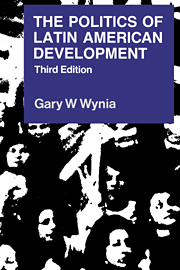Book contents
- Frontmatter
- Contents
- List of maps and tables
- Preface to the third edition
- Preface to the second edition
- Preface to the first edition
- Map 1 Latin America
- Map 2 Per capita gross domestic products 1987, measured in 1986 U.S. dollars. (Source: Inter-American Development Bank, Economic and Social Progress in Latin America, 1988, p. 540.)
- Part I Understanding Latin American politics
- 1 The Latin American predicament
- 2 The rules of the Latin American game
- 3 Players – I
- 4 Players – II
- 5 The stakes in the game
- Part II The political games played in Latin America
- Appendix: Tables
- Index
4 - Players – II
Published online by Cambridge University Press: 20 October 2009
- Frontmatter
- Contents
- List of maps and tables
- Preface to the third edition
- Preface to the second edition
- Preface to the first edition
- Map 1 Latin America
- Map 2 Per capita gross domestic products 1987, measured in 1986 U.S. dollars. (Source: Inter-American Development Bank, Economic and Social Progress in Latin America, 1988, p. 540.)
- Part I Understanding Latin American politics
- 1 The Latin American predicament
- 2 The rules of the Latin American game
- 3 Players – I
- 4 Players – II
- 5 The stakes in the game
- Part II The political games played in Latin America
- Appendix: Tables
- Index
Summary
Political parties
In Western democracies we take political parties for granted, confident that they will offer candidates, contest elections, and create governments. But it is not so everywhere because party behavior always depends on what other players allow parties to do. For example, we learned that elections are not the only means for creating governments in Latin America and, even where they are used, winning them does not guarantee the victors a full term in office. The military may step in and evict elected officials, foreign governments may subvert them, and opponents within the nation may use violence to bring them down. As a result, party politicians know that winning elections ensures nothing.
Parties play at least three roles in the Latin American game. First, many of them do compete in elections. In some countries, like Costa Rica and Venezuela, their life is fairly simple, requiring little more than intense campaigns aimed at winning free elections. But in others, like Argentina and Brazil, much more is required because, until recently, respect for constitutional rules was lacking. In Argentina, for example, between 1952 and 1982 three presidents were elected but none of them was allowed to complete a single term. Just as important as their vote totals was their failure to prevent their opponents from endorsing their removal by military officers who believed themselves more able than civilians to rule over their nation.
Second, parties also have played the part of conspirators.
- Type
- Chapter
- Information
- The Politics of Latin American Development , pp. 73 - 103Publisher: Cambridge University PressPrint publication year: 1990



